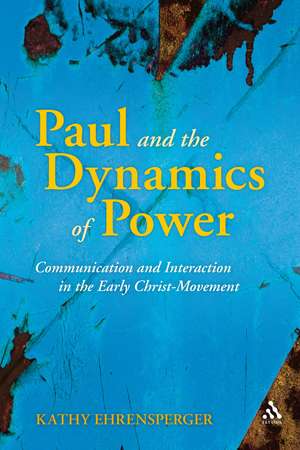Paul and the Dynamics of Power: Communication and Interaction in the Early Christ-Movement: The Library of New Testament Studies
Autor Dr. Kathy Ehrenspergeren Limba Engleză Paperback – 19 mai 2009
Paul and the Dynamics of Power questions whether such hierarchical tendencies are rightly identified within Paul's discourse of power. Furthermore it considers whether these are inherently and necessarily expressions of domination and control and are thus in opposition to a 'discipleship of equals'? In her careful analysis Ehrensperger draws on such wide-ranging figures as Derrida, Michel Foucault and James Scott. This enables fresh insights into Paul's use of authority and power in its first century context.
| Toate formatele și edițiile | Preț | Express |
|---|---|---|
| Paperback (1) | 264.57 lei 6-8 săpt. | |
| Bloomsbury Publishing – 19 mai 2009 | 264.57 lei 6-8 săpt. | |
| Hardback (1) | 1007.62 lei 6-8 săpt. | |
| Bloomsbury Publishing – 31 aug 2007 | 1007.62 lei 6-8 săpt. |
Din seria The Library of New Testament Studies
- 34%
 Preț: 509.52 lei
Preț: 509.52 lei - 22%
 Preț: 832.58 lei
Preț: 832.58 lei - 22%
 Preț: 832.09 lei
Preț: 832.09 lei - 24%
 Preț: 190.33 lei
Preț: 190.33 lei - 22%
 Preț: 832.65 lei
Preț: 832.65 lei - 23%
 Preț: 191.31 lei
Preț: 191.31 lei -
 Preț: 221.70 lei
Preț: 221.70 lei -
 Preț: 98.92 lei
Preț: 98.92 lei - 31%
 Preț: 830.87 lei
Preț: 830.87 lei - 22%
 Preț: 834.60 lei
Preț: 834.60 lei - 22%
 Preț: 831.59 lei
Preț: 831.59 lei - 30%
 Preț: 717.05 lei
Preț: 717.05 lei - 22%
 Preț: 835.03 lei
Preț: 835.03 lei - 30%
 Preț: 511.40 lei
Preț: 511.40 lei - 24%
 Preț: 190.33 lei
Preț: 190.33 lei -
 Preț: 158.77 lei
Preț: 158.77 lei - 30%
 Preț: 510.04 lei
Preț: 510.04 lei - 22%
 Preț: 832.99 lei
Preț: 832.99 lei - 30%
 Preț: 509.52 lei
Preț: 509.52 lei - 22%
 Preț: 832.80 lei
Preț: 832.80 lei - 22%
 Preț: 831.76 lei
Preț: 831.76 lei - 22%
 Preț: 834.93 lei
Preț: 834.93 lei - 22%
 Preț: 831.59 lei
Preț: 831.59 lei - 22%
 Preț: 832.41 lei
Preț: 832.41 lei - 22%
 Preț: 832.99 lei
Preț: 832.99 lei -
 Preț: 414.71 lei
Preț: 414.71 lei - 30%
 Preț: 773.65 lei
Preț: 773.65 lei - 22%
 Preț: 834.93 lei
Preț: 834.93 lei - 14%
 Preț: 511.81 lei
Preț: 511.81 lei -
 Preț: 222.16 lei
Preț: 222.16 lei - 30%
 Preț: 775.67 lei
Preț: 775.67 lei - 30%
 Preț: 1012.49 lei
Preț: 1012.49 lei - 30%
 Preț: 509.02 lei
Preț: 509.02 lei - 30%
 Preț: 656.90 lei
Preț: 656.90 lei -
 Preț: 469.92 lei
Preț: 469.92 lei -
 Preț: 471.68 lei
Preț: 471.68 lei -
 Preț: 173.21 lei
Preț: 173.21 lei - 30%
 Preț: 833.64 lei
Preț: 833.64 lei - 22%
 Preț: 834.93 lei
Preț: 834.93 lei - 31%
 Preț: 772.17 lei
Preț: 772.17 lei - 30%
 Preț: 774.20 lei
Preț: 774.20 lei - 14%
 Preț: 1124.92 lei
Preț: 1124.92 lei - 22%
 Preț: 948.51 lei
Preț: 948.51 lei - 14%
 Preț: 1128.84 lei
Preț: 1128.84 lei - 31%
 Preț: 1065.91 lei
Preț: 1065.91 lei - 22%
 Preț: 777.71 lei
Preț: 777.71 lei - 31%
 Preț: 1064.84 lei
Preț: 1064.84 lei - 22%
 Preț: 1063.44 lei
Preț: 1063.44 lei - 22%
 Preț: 889.49 lei
Preț: 889.49 lei - 22%
 Preț: 1006.06 lei
Preț: 1006.06 lei
Preț: 264.57 lei
Preț vechi: 303.18 lei
-13% Nou
Puncte Express: 397
Preț estimativ în valută:
50.63€ • 54.98$ • 42.53£
50.63€ • 54.98$ • 42.53£
Carte tipărită la comandă
Livrare economică 23 aprilie-07 mai
Preluare comenzi: 021 569.72.76
Specificații
ISBN-13: 9780567614940
ISBN-10: 0567614948
Pagini: 256
Dimensiuni: 156 x 234 x 20 mm
Greutate: 0.39 kg
Editura: Bloomsbury Publishing
Colecția T&T Clark
Seria The Library of New Testament Studies
Locul publicării:London, United Kingdom
ISBN-10: 0567614948
Pagini: 256
Dimensiuni: 156 x 234 x 20 mm
Greutate: 0.39 kg
Editura: Bloomsbury Publishing
Colecția T&T Clark
Seria The Library of New Testament Studies
Locul publicării:London, United Kingdom
Caracteristici
Contributes to a critical understanding of the relationship of Paul and his congregations in the context of first-century Judaism and the Roman Empire by investigating issues of power in the Pauline discourse.
Cuprins
1.The Pauline Letters: Presuppositions and Contexts of Reading
2.Contexts of Power in Contemporary Theory
3.The Exercise of Power - Networking in the Early Christ-Movement.
4. Power in Action - the Dynamics of Grace in Pauline Discourse
5. The Grace and Burden of Apostleship - Paul's Perception of Apostole
2.Contexts of Power in Contemporary Theory
3.The Exercise of Power - Networking in the Early Christ-Movement.
4. Power in Action - the Dynamics of Grace in Pauline Discourse
5. The Grace and Burden of Apostleship - Paul's Perception of Apostole
6. Power in Weakness - The Discourse of Confrontation and Conflict
7. Power in Interaction - Paul and the Discourse of Education
8. Power in Interaction - The Discourse of Imitation
9. Power in Interaction - The Discourse of Response-ability
10.The Dynamics of Power and the Challenge of Empowerment
Recenzii
Mention - New Testament Abstracts, Vol. 52 No. 3, 2008
"Overall the book is well written and extremely well researched. The author particularly shines when discussing contextual backgrounds for the various topics in the study. Ehrensperger's understanding of Paul's Jewish background and the context out of which Paul fulfills his apostolic calling is especially beneficial. The book is worth reading alone for the backgrounds provided on ancient education, family groups, and social networks. Ehrensperger integrates sociological and exegetical methods into seamless explanation of Paul's communications with the early Christ-following communities...Perhaps the book's greatest strengths are the implications that it provides for Christian leaders today. Leaders who seek to imitate Paul by embodying and demonstrating the values of the kingdom will be in position to empower their communities. When these values are demonstrated through discourse of grace and trust, communities are transformed. If pastors and other Christian leaders follow a model built on trust and mutual respect, demonstrated partially through weakness rather than dominance, then their organization will be better prepared to survive. Rather than attempting to build long-term hierarchies, Christian leaders ought to plan for obsolescence, preparing ministries to survive beyond their temporary presence." - Kenneth R. Solomon, Criswell Theological Review, Fall 2008
'This is a beautifully written and immensely stimulating book, with which every serious student of Paul ought to engage. One of its greatest merits is to show that even asymmetrical power relationships are not necessarily relationships of domination/ subordination, nor temporally permanent, nor lacking in mutuality and interdependence. Not only might this encourage a rethinking of our images of Paul; it also represents a challenge for Christian life and practice within contemporary Church and society.' Ian Boxall, St Stephen's House, Oxford, UK in Scripture Bulletin
Review in International Review of Biblical Studies, vol. 54:2007/08
'Ehrensperger's study is an excellent (re)consideration of the Pauline exercise of power in light of contemporary thought. Impressively, she takes seriously both the historical context of the early church and the language and concepts of recent studies on power (e.g. Derrida, Arendt and Foucault). The result is a well-balanced reading of the Pauline discourse of power which will benefit those interested in the social dynamics of early Christianity and Paul in general.' - Derek R. Brown, School of Divinity, University of Edinburgh, UK, in The Expository Times
"Overall the book is well written and extremely well researched. The author particularly shines when discussing contextual backgrounds for the various topics in the study. Ehrensperger's understanding of Paul's Jewish background and the context out of which Paul fulfills his apostolic calling is especially beneficial. The book is worth reading alone for the backgrounds provided on ancient education, family groups, and social networks. Ehrensperger integrates sociological and exegetical methods into seamless explanation of Paul's communications with the early Christ-following communities...Perhaps the book's greatest strengths are the implications that it provides for Christian leaders today. Leaders who seek to imitate Paul by embodying and demonstrating the values of the kingdom will be in position to empower their communities. When these values are demonstrated through discourse of grace and trust, communities are transformed. If pastors and other Christian leaders follow a model built on trust and mutual respect, demonstrated partially through weakness rather than dominance, then their organization will be better prepared to survive. Rather than attempting to build long-term hierarchies, Christian leaders ought to plan for obsolescence, preparing ministries to survive beyond their temporary presence." - Kenneth R. Solomon, Criswell Theological Review, Fall 2008
'This is a beautifully written and immensely stimulating book, with which every serious student of Paul ought to engage. One of its greatest merits is to show that even asymmetrical power relationships are not necessarily relationships of domination/ subordination, nor temporally permanent, nor lacking in mutuality and interdependence. Not only might this encourage a rethinking of our images of Paul; it also represents a challenge for Christian life and practice within contemporary Church and society.' Ian Boxall, St Stephen's House, Oxford, UK in Scripture Bulletin
Review in International Review of Biblical Studies, vol. 54:2007/08
'Ehrensperger's study is an excellent (re)consideration of the Pauline exercise of power in light of contemporary thought. Impressively, she takes seriously both the historical context of the early church and the language and concepts of recent studies on power (e.g. Derrida, Arendt and Foucault). The result is a well-balanced reading of the Pauline discourse of power which will benefit those interested in the social dynamics of early Christianity and Paul in general.' - Derek R. Brown, School of Divinity, University of Edinburgh, UK, in The Expository Times













